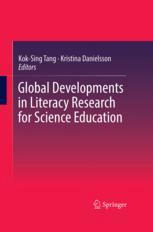

Most ebook files are in PDF format, so you can easily read them using various software such as Foxit Reader or directly on the Google Chrome browser.
Some ebook files are released by publishers in other formats such as .awz, .mobi, .epub, .fb2, etc. You may need to install specific software to read these formats on mobile/PC, such as Calibre.
Please read the tutorial at this link. https://ebooknice.com/page/post?id=faq
We offer FREE conversion to the popular formats you request; however, this may take some time. Therefore, right after payment, please email us, and we will try to provide the service as quickly as possible.
For some exceptional file formats or broken links (if any), please refrain from opening any disputes. Instead, email us first, and we will try to assist within a maximum of 6 hours.
EbookNice Team

Status:
Available4.6
32 reviewsThis book highlights recent developments in literacy research in science teaching and learning from countries such as Australia, Brazil, China, Finland, Germany, Hong Kong, New Zealand, Norway, Singapore, Spain, South Africa, Sweden, Taiwan, and the United States. It includes multiple topics and perspectives on the role of literacy in enhancing science teaching and learning, such as the struggles faced by students in science literacy learning, case studies and evaluations of classroom-based interventions, and the challenges encountered in the science classrooms. It offers a critical and comprehensive investigation on numerous emerging themes in the area of literacy and science education, including disciplinary literacy, scientific literacy, classroom discourse, multimodality, language and representations of science, and content and language integrated learning (CLIL). The diversity of views and research contexts in this volume presents a useful introductory handbook for academics, researchers, and graduate students working in this specialized niche area. With a wealth of instructional ideas and innovations, it is also highly relevant for teachers and teacher educators seeking to improve science teaching and learning through the use of literacy.